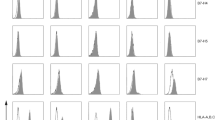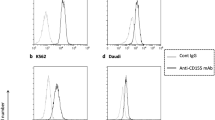Summary
T cells are important effectors in anti-tumor immunity, and aberrant expression of B7 family members may contribute to tumor evasion. In this study, we analyzed expression of costimulatory molecules on human hematologic tumor cells and explored whether B7-H3, a member of the B7 superfamily, is an effective target for T cell mediated cytotoxicity toward hematologic malignancy. We investigated the bispecific antibody anti-CD3 × anti-B7-H3 (B7-H3Bi-Ab) for its ability to redirect T cells to target B7-H3 positive hematologic tumors, including Thp-1, K562, Daudi cells and a primary culture. The capacity of T cells armed with B7-H3Bi-Ab to kill hematologic tumors was evaluated by lactate dehydrogenase assay, flow cytometry, ELISA, and luciferase quantitative assay at an effector/target ratio of 5:1. Compared with unarmed T cells, B7-H3Bi-Ab-armed T cells exhibited significant cytotoxicity toward hematological tumor cells. Moreover, B7-H3Bi-Ab-armed T cells secreted more IFN-γ, TNF-α, IL-2, and Granzyme B and expressed higher levels of activating marker CD69 compared to unarmed T cells. In conclusion, B7-H3Bi-Ab enhances the ability of T cells to kill hematologic tumor cells, and B7-H3 may serve as a novel target for immunotherapy against hematologic malignancy.






Similar content being viewed by others
Explore related subjects
Discover the latest articles and news from researchers in related subjects, suggested using machine learning.References
Bachireddy P, Burkhardt UE, Rajasagi M, Wu CJ (2015) Haematological malignancies: at the forefront of immunotherapeutic innovation. Nat Rev Cancer 15(4):201–215
Im A, Pavletic SZ (2017) Immunotherapy in hematologic malignancies: past, present, and future. J Hematol Oncol 10(1):94
Shallis RM, Wang R, Davidoff A, Ma X, Zeidan AM (2019) Epidemiology of acute myeloid leukemia: recent progress and enduring challenges. Blood Rev pii: S0268-960X(18): 30139–5. https://doi.org/10.1016/j.blre.2019.04.005
Chapoval AI, Ni J, Lau JS, Wilcox RA, Flies DB, Liu D, Dong H, Sica GL, Zhu G, Tamada K, Chen L (2001) B7-H3: a costimulatory molecule for T cell activation and IFN-gamma production. Nat Immunol 2(3):269–274
Picarda E, Ohaegbulam KC, Zang X (2016) Molecular pathways: targeting B7-H3 (CD276) for human cancer immunotherapy. Clin Cancer Res 22(14):3425–3431
Guery T, Roumier C, Berthon C, Renneville A, Preudhomme C, Quesnel B (2015) B7-H3 protein expression in acute myeloid leukemia. Cancer Med 4(12):1879–1883
Hu Y, Lv X, Wu Y, Xu J, Wang L, Chen W, Zhang W, Li J, Zhang S, Qiu H (2015) Expression of costimulatory molecule B7-H3 and its prognostic implications in human acute leukemia. Hematology 20(4):187–195
Ramsay AG, Clear AJ, Fatah R, Gribben JG (2012) Multiple inhibitory ligands induce impaired T-cell immunologic synapse function in chronic lymphocytic leukemia that can be blocked with lenalidomide: establishing a reversible immune evasion mechanism in human cancer. Blood 120(7):1412–1421
Zhu XW, Wang J, Zhu MX, Wang YF, Yang SY, Ke XY (2019) MicroRNA-506 inhibits the proliferation and invasion of mantle cell lymphoma cells by targeting B7H3. Bioch Biophys Res Commun 508(4):1067–1073
Lin L, Cao L, Liu Y, Wang K, Zhang X, Qin X, Zhao D, Hao J, Chang Y, Huang X, Liu B, Zhang J, Lu J, Ge Q (2018) B7-H3 promotes multiple myeloma cell survival and proliferation by ROS-dependent activation of Src/STAT3 and c-Cbl-mediated degradation of SOCS3. Leukemia. https://doi.org/10.1038/s41375-018-0331-6
Lee YH, Martin-Orozco N, Zheng P, Li J, Zhang P, Tan H, Park HJ, Jeong M, Chang SH, Kim BS, Xiong W, Zang W, Guo L, Liu Y, Dong ZJ, Overwijk WW, Hwu P, Yi Q, Kwak L, Yang Z, Mak TW, Li W, Radvanyi LG, Ni L, Liu D, Dong C (2017) Inhibition of the B7-H3 immune checkpoint limits tumor growth by enhancing cytotoxic lymphocyte function. Cell Res 27(8):1034–1045
Janakiram M, Shah UA, Liu W, Zhao A, Schoenberg MP, Zang X (2017) The third group of the B7-CD28 immune checkpoint family: HHLA2, TMIGD2, B7x, and B7-H3. Immunol Rev 276(1):26–39
Zhang W, Wang J, Wang Y, Dong F, Zhu M, Wan W, Li H, Wu F, Yan X, Ke X (2015) B7-H3 silencing by RNAi inhibits tumor progression and enhances chemosensitivity in U937 cells. Onco Targets Ther 8:1721–1733
Zhang W, Wang Y, Wang J, Dong F, Zhu M, Wan W, Li H, Wu F, Yan X, Ke X (2015) B7-H3 silencing inhibits tumor progression of mantle cell lymphoma and enhances chemosensitivity. Int J Oncol 46(6):2562–2572
Nagase-Zembutsu A, Hirotani K, Yamato M, Yamaguchi J, Takata T, Yoshida M, Fukuchi K, Yazawa M, Takahashi S, Agatsuma T (2016) Development of DS-5573a: a novel afucosylated mAb directed at B7-H3 with potent antitumor activity. Cancer Sci 107(5):674–681
Majzner RG, Theruvath JL, Nellan A, Heitzeneder S, Cui Y, Mount CW, Rietberg SP, Linde MH, Xu P, Rota C, Sotillo E, Labanieh L, Lee DW, Orentas RJ, Dimitrov DS, Zhu Z, St Croix B, Delaidelli A, Sekunova A, Bonvini E, Mitra SS, Quezado MM, Majeti R, Monje M, Sorensen PH, Maris JM, Mackall CL (2019) CAR T cells targeting B7-H3, a pan-cancer antigen, demonstrate potent preclinical activity against pediatric solid tumors and brain tumors. Clin Cancer Res 25:2560–2574. https://doi.org/10.1158/1078-0432.CCR-18-0432
Hoffman LM, Gore L (2014) Blinatumomab, a bi-specific anti-CD19/CD3 bite((R)) antibody for the treatment of acute lymphoblastic leukemia: perspectives and current pediatric applications. Front Oncol 4:63
Reusch U, Harrington KH, Gudgeon CJ, Fucek I, Ellwanger K, Weichel M, Knackmuss SH, Zhukovsky EA, Fox JA, Kunkel LA, Guenot J, Walter RB (2016) Characterization of CD33/CD3 tetravalent bispecific tandem diabodies (tandAbs) for the treatment of acute myeloid leukemia. Clin Cancer Res 22(23):5829–5838
Demichelis-Gomez R, Perez-Samano D, Bourlon C (2019) Bispecific antibodies in hematologic malignancies: when, to whom, and how should be best used? Curr Oncol Rep 21(2):17
Ma J, Ma P, Zhao C, Xue X, Han H, Liu C, Tao H, Xiu W, Cai J, Zhang M (2016) B7-H3 as a promising target for cytotoxicity T cell in human cancer therapy. Oncotarget 7(20):29480–29491
Ma W, Ma J, Ma P, Lei T, Zhao M, Zhang M (2018) Targeting immunotherapy for bladder cancer using anti-CD3x B7-H3 bispecific antibody. Cancer Med 7(10):5167–5177
Ma J, Shang T, Ma P, Sun X, Zhao J, Sun X, Zhang M (2019) Bispecific anti-CD3 x anti-B7-H3 antibody mediates T cell cytotoxic ability to human melanoma in vitro and in vivo. Investig New Drugs. https://doi.org/10.1007/s10637-018-00719-7
Ma J, Han H, Liu D, Li W, Feng H, Xue X, Wu X, Niu G, Zhang G, Zhao Y, Liu C, Tao H, Gao B (2013) HER2 as a promising target for cytotoxicity T cells in human melanoma therapy. PLoS One 8(8):e73261
Yang Y (2015) Cancer immunotherapy: harnessing the immune system to battle cancer. J Clin Invest 125(9):3335–3337
Clynes RA, Desjarlais JR (2019) Redirected T cell cytotoxicity in cancer therapy. Annu Rev Med 70:437–450
Sathaliyawala T, Kubota M, Yudanin N, Turner D, Camp P, Thome JJ, Bickham KL, Lerner H, Goldstein M, Sykes M, Kato T, Farber DL (2013) Distribution and compartmentalization of human circulating and tissue-resident memory T cell subsets. Immunity 38(1):187–197
Ross SL, Sherman M, McElroy PL, Lofgren JA, Moody G, Baeuerle PA, Coxon A, Arvedson T (2017) Bispecific T cell engager (BiTE(R)) antibody constructs can mediate bystander tumor cell killing. PLoS One 12(8):e0183390
Fatehchand K, McMichael EL, Reader BF, Fang H, Santhanam R, Gautam S, Elavazhagan S, Mehta P, Buteyn NJ, Merchand-Reyes G, Vasu S, Mo X, Benson DM Jr, Blachly JS, Carson WE 3rd, Byrd JC, Butchar JP, Tridandapani S (2016) Interferon-γ promotes antibody-mediated fratricide of acute myeloid leukemia cells. J Biol Chem 291(49):25656–25666
Sznol M, Chen L (2013) Antagonist antibodies to PD-1 and B7-H1 (PD-L1) in the treatment of advanced human cancer--response. Clin Cancer Res 19(19):5542
Yamashita T, Tamura H, Satoh C, Shinya E, Takahashi H, Chen L, Kondo A, Tsuji T, Dan K, Ogata K (2009) Functional B7.2 and B7-H2 molecules on myeloma cells are associated with a growth advantage. Clin Cancer Res 15(3):770–777
Feucht J, Kayser S, Gorodezki D, Hamieh M, Doring M, Blaeschke F, Schleqel P, Bosmuller H, Quintanilla-Fend L, Ebinger M, Lang P, Handgretinger R, Feuchtinger T (2016) T-cell responses against CD19+ pediatric acute lymphoblastic leukemia mediated by bispecific T-cell engager (BiTE) are regulated contrarily by PD-L1 and CD80/CD86 on leukemic blasts. Oncotarget 7(47):76902–76919
Maeda A, Yamamoto K, Yamashita K, Asagoe K, Nohgawa M, Kita K, Iwasaki H, Ueda T, Takahashi A, Sasada M (1998) The expression of co-stimulatory molecules and their relationship to the prognosis of human acute myeloid leukaemia: poor prognosis of B7-2-positive leukaemia. Br J Haematol 102(5):1257–1262
Davids MS, Kim HT, Bachireddy P, Costello C, Liguori R, Savell A, Lukez AP, Avigan D, Chen YB, McSweeney P, LeBoeuf NR, Rooney MS, Bowden M, Zhou CW, Granter SR, Hornick JL, Rodig SJ, Hirakawa M, Severgnini M, Hodi FS, Wu CJ, Ho VT, Cutler C, Koreth J, Alyea EP, Antin JH, Armand P, Streicher H, Ball ED, Ritz J, Bashey A, Soiffer RJ, Leukemia, Lymphoma Society Blood Cancer Research P (2016) Ipilimumab for patients with relapse after allogeneic transplantation. N Engl J Med 375 (2):143–153
Funding
This work is funded by grants from the National Nature Science Foundation of China (No.31400754), Beijing Municipal Administration of Hospitals’ Ascent Plan (DFL20150701), and Independent Research Project of China Academy of Chinese Medical Sciences (No.YZ-1713).
Author information
Authors and Affiliations
Corresponding author
Ethics declarations
Conflict of interest
Xin Sun, Yang Yu, Li Ma, Xin Xue, Zhenkui Gao, Juan Ma, and Zhang Man have declared that they have no conflicting interests.
Ethical approval
All procedures performed in studies involving human participants were in accordance with the ethical standards of the institutional and/or national research committee and with the 1964 Helsinki Declaration and its later amendments or comparable ethical standards. This article does not contain any studies with animals performed by any of the authors.
Informed consent
Informed consent was obtained from all participants included in the study.
Additional information
Publisher’s note
Springer Nature remains neutral with regard to jurisdictional claims in published maps and institutional affiliations.
Rights and permissions
About this article
Cite this article
Sun, X., Yu, Y., Ma, L. et al. T cell cytotoxicity toward hematologic malignancy via B7-H3 targeting. Invest New Drugs 38, 722–732 (2020). https://doi.org/10.1007/s10637-019-00819-y
Received:
Accepted:
Published:
Issue Date:
DOI: https://doi.org/10.1007/s10637-019-00819-y




